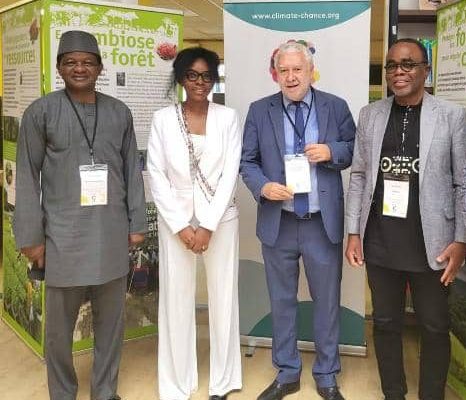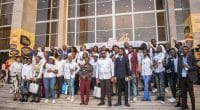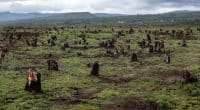At the opening of the Fifth Climate Chance Africa Conference (CCCA) on Housing and Urban Development in Yaoundé on 23 October 2023, participants from all continents clearly grasped the urgent need to develop synergies to help achieve the 11th Sustainable Development Goal (SDG11) on sustainable cities. In this interview, four high-level speakers analyse the housing crisis and climate hazards, as well as the financing solutions that these issues entail. They are Ronan Dantec, French senator and chairman of the Climate Chance association, Augustin Tamba, mayor of Yaoundé 7 and chairman of the United Councils and Cities of Cameroon (UCCC), Luc Gnacadja, former environment minister of Benin, and Stéphanie Njiomo, ambassador of the Global Compact for the Environment in Cameroon and Central Africa.
At the opening of the Fifth Climate Chance Africa Conference (CCCA) on Housing and Urban Development in Yaoundé on 23 October 2023, participants from all continents clearly grasped the urgent need to develop synergies to help achieve the 11th Sustainable Development Goal (SDG11) on sustainable cities. In this interview, four high-level speakers analyse the housing crisis and climate hazards, as well as the financing solutions that these issues entail. They are Ronan Dantec, French senator and chairman of the Climate Chance association, Augustin Tamba, mayor of Yaoundé 7 and chairman of the United Councils and Cities of Cameroon (UCCC), Luc Gnacadja, former environment minister of Benin, and Stéphanie Njiomo, ambassador of the Global Compact for the Environment in Cameroon and Central Africa.
Benoit-Ivan Wansi: After months of preparation in partnership with AFRIK 21, the fifth Climate Chance Africa Conference (CCCA) is finally here. The event will be held from 23 to 24 October 2023 in Yaoundé. Can you tell us why the Cameroonian capital was chosen?
Ronan Dantec: The choice of Yaoundé to host this event is linked to various exchanges with the United Nations Human Settlements Programme (UN-Habitat), which has a strong presence in Cameroon. Secondly, because of our old friendly ties with the Cameroonian Minister for Housing and Urban Development (Célestine Ketcha Courtès, editor’s note), who is a former local councillor and very active in international networks. Yaoundé is also a city that is fairly representative of the challenges of sustainable housing in Africa.
It’s important to note that each year our meeting focuses on a specific subject related to climate change. In 2022, Climate Chance was in Dakar, Senegal, to talk about mobility. And for this year, 2023, the issue of housing seemed to us to be crucial. So we’re delighted to be here at the Institut français du Cameroun (IFC) to talk about it. The audience is large and made up of a wide range of stakeholders. It’s clear that this is a major issue for our planet.
These days, it’s almost impossible to live in urban centres. The reason for this is the scarcity of housing and sometimes the explosion in prices. How can we break this deadlock?
Luc Gnacadja: We have to look at the African city as it works. At the moment, there is a kind of dichotomy, with the concept of the working-class or informal neighbourhood on one side and the formal neighbourhood on the other. I was pleased to hear the Director of the French Development Agency (AFD) in Cameroon give examples of initiatives in cities such as Kigali in Rwanda, where there was talk of helping the inhabitants of informal neighbourhoods to upgrade their housing themselves. It’s worth noting that two-thirds of cities on the continent are informal. When we talk about African cities, we need to bear in mind that 80% of the economy is also informal. So we need to combine all these parameters if we are to design sustainable housing in Africa.
The Association of United Councils and Cities of Cameroon (CVUC) is working with Climate Chance, the International Association of Francophone Mayors (AIMF) and other platforms involved in the ecological transition. What can decentralised cooperation between cities contribute in the face of the climate emergency?
Augustin Tamba: Within these cities in Cameroon, we already have a territorial marketing programme that calls for very active diplomacy to try and raise awareness of this issue both internally and internationally. On the question of housing, it’s social housing that is the subject of most debate, because it doesn’t exist in the economy. Social housing has a cost. Except that there is galloping inflation in the markets with which we are all familiar, and this has an impact on the cost of materials. Who is going to make up the difference to ensure that this housing is accessible at all social costs? That’s the problem. So this does indeed call for production, and is fully in line with what we have called the Development Policies for Productive Communities.
This is not a call for international philanthropy, but on the contrary an encouragement for economic co-production at local level, particularly in agriculture, fish farming and other areas. And on a macro level, we can work together to produce housing that is accessible to everyone. So financing is just as vital as adapting the engineering.
Can Africa succeed in developing and imposing its vision of sustainable housing?
Stéphanie Njiomo: We are in a context marked by crises linked to habitats. So in terms of what Africa could do, I’d like to stress that the problem is both quantitative and qualitative. It is regrettable that we are in the process of copying an entire construction model that has not necessarily proved its worth, either now or in the long term. With the climate crisis at stake, we’re arguing for a return to these tried and tested local materials, particularly in the northern regions of Cameroon.
What types of materials are you referring to?
Stéphanie Njiomo: We have nearby materials such as terracotta, raw earth, which can be combined with wood or straw? We also have stone, which makes up the space, and different materials through which we can make our African territories more attractive. So it’s a habitat that could also become a gateway to African tourism. We need to return to these ancestral methods.
At the end of the CCCA2023, an advocacy document will be drawn up on behalf of African climate stakeholders. It will be presented next November at the 28th Conference of the Parties (COP28) in Dubai, United Arab Emirates (UAE). What will the Yaoundé Roadmap contain?
Ronan Dantec: The first thing is to strengthen local authorities. Climate Chance’s approach is to look at what African players are proposing, in particular United Cities and Local Governments of Africa (UCLGA), which is a long-standing partner. To put it plainly, the housing issue cannot be resolved unless local authorities have control over the land, unless there is tax revenue to enable access to loans, and unless there is more engineering. The “Yaoundé Roadmap” therefore reminds us that strong local authorities are the first step. To achieve this, it is also important to overcome the mistrust of national authorities towards local authorities, which has long been a feature of Africa.
We also need to accept informal housing, but avoid it in areas that are extremely risky because of global warming. We saw this again recently with the Mbankolo scenario in Cameroon (deadly landslide in the suburbs of Yaoundé, editor’s note). The future of cities lies elsewhere than in cities, i.e. either we have a massive rural exodus that I, as a Breton (living in Brittany in the west of France, editor’s note) experienced in the 20th century, with the countryside emptying out in just a few decades. Or are we trying to keep more people in the countryside! Which means improving living conditions, creating local jobs that will enable the inhabitants of medium-sized towns to stay there rather than converge on the major metropolises. We will also be presenting this Yaoundé roadmap at the 12th World Urban Forum (WUF12) in the autumn of 2024 in Egypt.
Read also- AFRICA: Climate Chance Summit on sustainable housing opens on 23 October in Yaoundé
According to United Nations (UN) forecasts, Africa’s population is set to double by 2050 to 2.4 billion. As you know, demographic growth of this magnitude means a growing need for housing, road infrastructure, drinking water and sanitation services. Is the continent ready to meet these challenges? If not, how can we prepare for them now?
Luc Gnacadja: Africa is ready, it has the potential. The continent just needs to review the software it has used in the past. The informality we’re talking about is the adaptation of populations to urban fragmentation, and we’re talking about mapping the areas at risk, for example, so that we can better anticipate. “Anticipation” must be the key word for urban development in Africa. Our cities are not yet competitive enough, yet a country can only be prosperous if its cities prosper. So we need to make sure that investment is possible at local authority level. We need to enable them to seek funding in line with their potential. This is also one of the avenues we need to explore.
Financing sustainable development is at the heart of current concerns. You have proposed the creation of an intervention fund to strengthen economic and climate resilience. How could this be set up, and does the private sector have a specific role to play?
Augustin Tamba: I think it’s first and foremost a question of international political will. These funds will be collected from the companies that pollute, in particular the oil and logging industries. The principle would be to levy taxes, a sort of margin on exploitation, so as not to suffocate these multinationals.
I think that from the moment we make a profit in Cameroon, it’s only fair that we should give up something to put into this fund, which would be used judiciously. It will be on the basis of upstream strategic thinking that will enable us to fight effectively against the much-discussed climate change. Because the crux of the matter is funding. And I’m calling for greater international justice on climate change, so that the countries of the North can make a real contribution.
Interview by Benoit-Ivan Wansi





